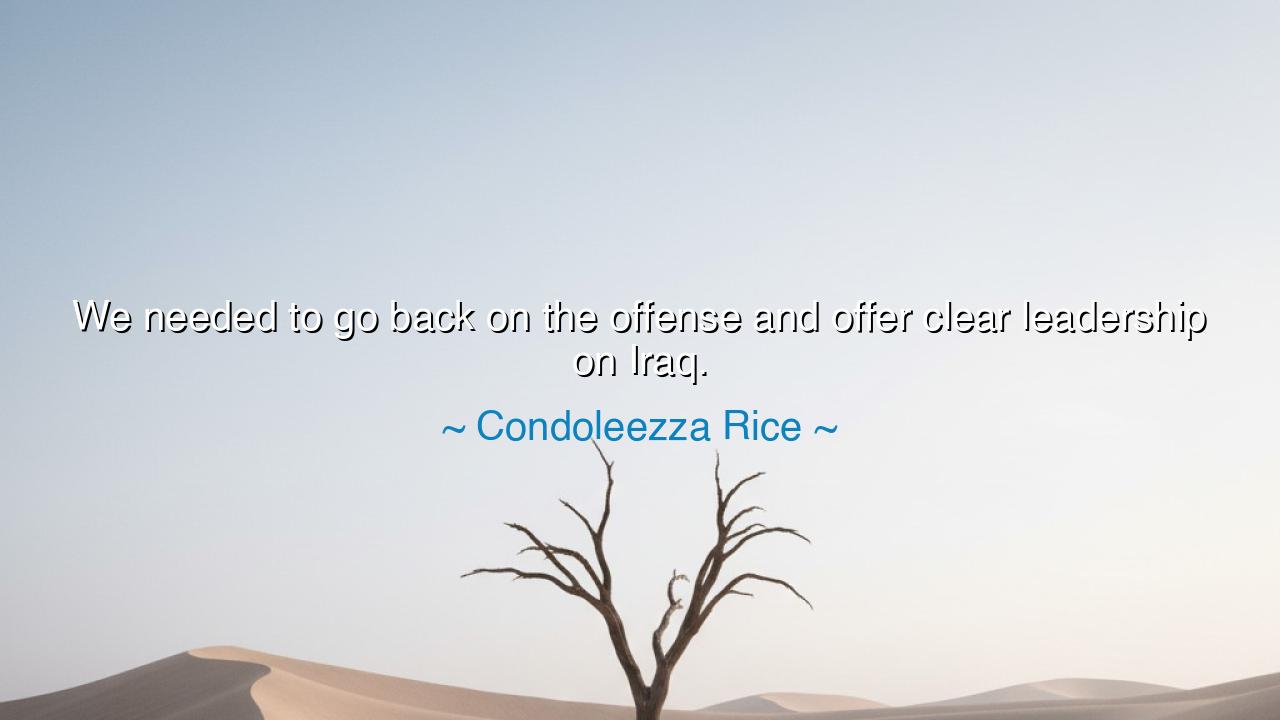
We needed to go back on the offense and offer clear leadership on






In the resolute and commanding words of Condoleezza Rice, we hear the echo of a stateswoman grappling with one of the most turbulent chapters of modern history: “We needed to go back on the offense and offer clear leadership on Iraq.” Though these words arise from the realm of politics and war, their resonance extends beyond the battlefield. They speak to the eternal truth that in times of uncertainty and confusion, the path forward demands not hesitation, but clarity, courage, and conviction. Rice’s statement is not merely a reflection on strategy — it is a call to action, a reminder that when the world falters, those who lead must not withdraw into fear, but must step boldly into purpose.
The origin of this quote lies in the years following the U.S. intervention in Iraq, a conflict that divided nations and tested the resolve of leadership. As National Security Advisor and later as Secretary of State, Condoleezza Rice stood at the crossroads of diplomacy and defense, where decisions carried the weight of countless lives and the destiny of nations. In those turbulent times, criticism and uncertainty swirled like desert storms — yet Rice’s words reveal her guiding philosophy: that retreat into indecision only deepens chaos, and that leadership, however difficult, must be assertive, not reactive. For to stand idle while danger grows is to surrender not only ground, but also vision.
When Rice speaks of going “back on the offense,” she invokes an idea far older than modern warfare — the principle that strength must be active, not passive. In the ancient world, Alexander the Great understood this well. When his army, weary and outnumbered, hesitated before the Persian host, he did not entrench or withdraw; he advanced, striking swiftly where the enemy least expected. His boldness, not his caution, changed the course of empires. So too did Rice’s philosophy echo this ancient spirit — the belief that leadership requires motion, and that to lead is to act when others would stand still.
Yet Rice’s words are not only about battlefields and borders. They embody a deeper truth about leadership itself — that it must always bring clarity to confusion. To “offer clear leadership,” she insists, is to bring light where there is darkness, to speak truth where there is noise, to remind people of their shared purpose when fear has divided them. True leadership is not the absence of doubt, but the mastery of it. Just as a captain steadies the helm through storm and spray, the leader must hold fast to vision even when the winds of public opinion rage.
Consider the example of Winston Churchill, who, when Britain stood alone against tyranny, refused to yield to despair. He did not speak softly to soothe his people; he spoke fiercely to awaken them. His words — “We shall never surrender” — became both shield and sword. In that same spirit, Rice’s call for offense and leadership in the face of turmoil reminds us that progress and peace are not won by retreat, but by resolve. Whether on the field of war or in the halls of governance, hesitation breeds disorder; only the courage to act can bring forth new order from chaos.
But there is also humility in Rice’s vision — a recognition that leadership, though commanding, must remain guided by purpose greater than self. To lead on Iraq, or any matter of the world’s weight, is not merely to pursue victory, but to restore stability and hope where conflict has sown despair. For the measure of leadership is not the might of the leader, but the peace that follows their decisions. The offense Rice spoke of was not a hunger for domination, but a yearning to replace confusion with conviction, and paralysis with direction.
So let this be the lesson drawn from her words: whether in the governance of nations, the guidance of communities, or the challenges of one’s own life — there are moments when retreat is not safety, but surrender. When the times demand it, you must go on the offense — not in anger, but in purpose; not in arrogance, but in clarity. Do not wait for circumstances to define you; define them through your vision and your courage. For true leadership, as Condoleezza Rice teaches, is not born in comfort, but in crisis.
Therefore, children of the future, remember: when fear whispers that you should wait, act. When doubt tells you to withdraw, advance. When darkness clouds your path, lead with the light of your conviction. For the world does not change through those who stand aside — it changes through those who step forward, those who, in the words of Condoleezza Rice, take the offense and bring forth the clear leadership that history demands.






AAdministratorAdministrator
Welcome, honored guests. Please leave a comment, we will respond soon